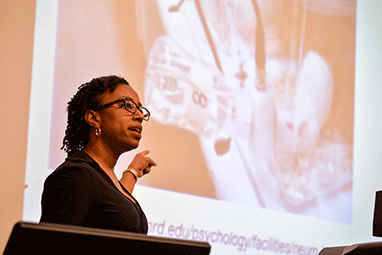SPARTANBURG, S.C. – Dr. Nicole Redmond’s keynote lecture on health disparities to a packed crowd was one of dozens of events, new initiatives and recognitions at Wofford college that resulted from the work of the Presidential Committee on Diversity and Inclusion.
Redmond, a 1996 Wofford graduate, shared her work on racial/ethnic and geographic disparities in psychosocial, behavioral and clinical cardiovascular disease risk factors as a medical officer in the National Heart, Lung and Blood Institute.
According to the committee’s report, the Diversity Speakers Series in which Redmond took part and a myriad of other campus events that took place during the 2017-18 academic year were aimed at building “cultural bridges by being more accessible and inclusive of historically underrepresented groups.” The events included the Black Alumni Summit, a DACA panel discussion with alumni and DACA-protected students, diversity and inclusion training for the Wofford community, LGBTQIA ally training for students and more robust heritage month celebrations, including the college’s first Pride Month celebration.
“During this past academic year, 2017-18, we focused on implementing and institutionalizing several of the recommendations we proposed in our first report,” says Dr. Ramon Galiñanes Jr., chair of the 17-member committee that includes students, faculty and staff. The report noted the transition to “a more team-based, collaborative approach to diversity and inclusion” with promotions of Dr. Begoña Caballero-Garcia, a professor in the Department of Modern Languages, Literatures and Cultures, to the position of dean of diversity and inclusion; Demario Watts to assistant dean of students for diversity and leadership development; and Arsenio Parks to director of diversity and inclusion admission. “This organizational change will help us realize our strategic vision of building a diverse and inclusive 21st century liberal arts college in which we can all learn, grow and thrive,” adds Galiñanes, director of the Bonner Scholars Program in the Center for Community-Based Learning.
Boosting access and inclusion was an impetus for the inaugural Gateway Scholars program for first-year students who identify as first-generation, low-income and/or DACA-protected. Intergenerational Connections, a project overseen by Dr. Kara Bopp, associate professor and chair of the Department of Psychology, combined diversity and inclusion with community-based learning. Bopp received a grant to connect college students with low-income, older adults. The committee also created the inaugural Diversity and Inclusion awards for students, faculty and staff and supported the Office of Student Success in presenting first-generation student informational dinners to further the college’s focus on diversity and inclusion.
Community support, new initiatives and professional development events and initiatives during the year that highlighted the commitment to “living our ideals of being part of a diverse and inclusive 21st century liberal arts college” included the creation of LevelUp, a four-year program designed to be more inclusive of student-athletes and to provide them with professional development skills; a search advocate program to advance more inclusive hiring of new faculty and staff members; LGBTQIA ally training for faculty and staff; a seminar series on inclusive pedagogy and the creation of an inclusive pedagogy book club; the creation of a support group for multicultural women and allies; the creation of a diversity-related mini-grant fund to promote diversity and inclusion in the area of campus climate, access and outreach; and other programs and forums.
Galiñanes says the committee also reaffirmed recommendations regarding establishing competitive beginning salary and start-up incentives for new minority hires; creating an “International American South” scholarship program to provide tuition discounts for employees of select international companies in the Upstate to leverage the importance of the international community and creating an international student scholarship program to recruit more international students; an expansion of Wofford’s first-generation college student scholarship program; and expanding the college’s Bonner Scholarship Program by increasing the number of scholars from 15 first-year students to 20 students each year.
The Presidential Committee on Diversity and Inclusion was created out of a campus-wide charge issued by President Nayef Samhat, who noted that while Wofford “prides itsef on its well-earned reputation for creating a welcoming and respectful community, we should always strive to make everyone feel included, represented and at home on this campus.”
Galiñanes says the committee has taken the opportunity to “critically examine who we are as a community and how we can create a more diverse and inclusive community in which all of us are welcome and are able to thrive. Working together to create such a community is not just a matter of fairness – which is indeed fundamental to a Methodist-affiliated college – but it also is a matter of providing all Wofford students a real-world experience in which they are prepared to engage across lines of meaningful differences and be successful in the 21st century.”
Wofford advances diversity and inclusion
Presidential committee releases 2017-18 progress report
Dr. Nicole Redmond '96
2018-08-15